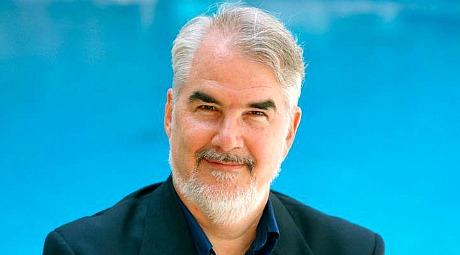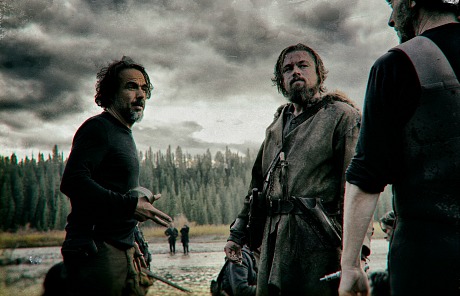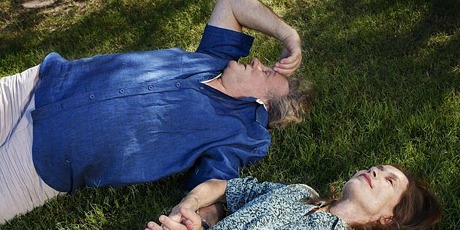I hated the last hour of Man of Steel, but it never occured to me until now that the color scheme might been an aspect of the problem. Give us those nice bright colors. Give us the greens of summers. Make us think all the world’s a sunny day, oh yeah.
Month: April 2015
Corliss Is Gone
Old-school, classic-era film critic Richard Corliss, one of the brightest, sharpest and most highly regarded film seers and scholars of the late 20th Century and early aughts, a guy whose opinions caused shifts in the tectonic plates of Hollywood commerce during his Time days of the ’80s and ’90s, died last night from a stroke. He was only 71. I’m sure he was planning to cover next month’s Cannes Film Festival, which he’s been attending without fail for decades (and at which he always wore those same color-dappled, studio-logo slip-on canvas sneakers), and I’ll bet he’s hugely pissed about missing it.

Richard Corliss (1944 – 2015).
Sad hugs and condolences to his wife Mary and all his friends, colleagues, ex-editors and admirers.
From my struggling freelance perspective the four biggest guns of the Manhattan film critic realm in the ’70s and ’80s were Corliss, Pauline Kael, Andrew Sarris and Richard Schickel, who’s thankfully still with us. There’s a certain metaphor in the passing of these departed legends of print, prose and inspired perception. FishbowlNY‘s Richard Horgan commented last September on the gradual weakening of the power of the classic film critic gang and the rise of online film crowd and the passing of the baton.
Jonathan Shields Lays An Egg
Every director flubs it now and then, even with good elements in place. But the likelihood of a big-time director openly admitting, even in the big-studio era and even to friends behind closed doors, that he dropped the ball in some kind of calamitous way is pretty slim, I’m guessing. This kind of candor, even in the days of Dore Schary, Vincent Minnelli and John Houseman, happened in front of a bathroom mirror, if at all. If you haven’t seen the film, Kirk Douglas is beating himself up in this scene for having miscalculated on the level of Michael Cimino‘s Heaven’s Gate. How many directors, producers and studio chiefs have ever admitted any degree of failure to themselves under any circumstances, in any environment or era?
The Short-Timers
Games of Thrones star Kit Harrington is roughly 5′ 7″. By my sights that makes him too short to be a romantic leading man and, as I noted in my Pompeii review, too short to be a fearsome gladiator. But I’m not going to let this get in the way of my presumed enjoyment of James Kent‘s Testament of Youth (Sony Pictures Classics, 6.5.15), which looks impassioned and first-rate in a sort of atmospheric Masterpiece Theatre-meets-the-horrors-of-World War I fashion. Very warmly received when it played last January’s London Film Festival. What about screenings between now and May 7th, Sony Classics publicity, which is when I leave for France? Next week or the week after, I mean.
The Four Streeps…Or Is It Five?
This morning I was roughing out my review of Thomas Vinterberg‘s rooted, disciplined and highly beguiling Far From The Madding Crowd (Fox Searchlight, 5.1) and thinking about Carey Mulligan‘s invested, spot-on performance as Bathsheba Everdeen, and about how I’ll soon be catching her reportedly first-rate performance on the New York stage in David Hare‘s Skylight, and about how she’s really defined herself as a kind of young Meryl Streep-like actress — gifted, gutsy, poised, refined — since her big breakout in ’09’s An Education.
And then it hit me that there are actually four top-tier actresses who exude that drop-dead, crack-of-the-bat Streepitude, each occupying their own decade along with their naturally unique shadings. There’s Streep herself, of course — now 65 (born on 6.22.49) and in no way slowing down, probably game for another 20 years of performing or even beyond. Cate Blanchett, 45 (dob: 5.14.69) and totally at the top of her game, genius and skill to burn. Jessica Chastain, 38, also peaking with absolute command, exuding by any yardstick the same degree of class and expertise as her two elders. And Mulligan, who turns 30 on 5.28. I suppose some would argue that Rooney Mara, only a month younger than Mulligan, belongs on the same marble pedestal but I’m not yet perceiving the same stillwater + whiplashy quality that I’ve long sensed in the other four.
Cinemacon Buzz Suggests Lubezki Eyeing 3rd Oscar for Revenant Lensing; DiCaprio vs. Depp for Best Actor?
With the 20th Century Fox’s Cinemacon presentation having just concluded, the buzz is that Alejandro G. Inarritu‘s The Revenant is looking like a definite Best Picture contender, the natural-light photography by dp Emmanuel Lubezki also seems Oscar-worthy, and that Leonardo DiCaprio, who plays the lead, may well emerge as a Best Actor contender.

Boxoffice.com‘s Phil Contrino sent the following message an hour ago: “Based on the footage we saw here for Scott Cooper‘s Black Mass and Alejandro G. Inarritu‘s The Revenant, I’ll be very surprised if we don’t see an intense Best Actor race between Johnny Depp and Leonardo DiCaprio…very impressive stuff.”
A half-hour later I heard from Thomas Schultze, Munich-based critic and correspondent for the German trade magazine Blickpunkt, and he shared the following: “The Revenant footage is breathtaking. It ran between 60 to 90 seconds. A montage of stuff with no dialogue. The whole thing is being shot with natural light…no artificial light of any kind…and my thoughts were that Lubezski is going to be in the running for his third Academy Award, and that the Academy is going to think they’ve given Inarritu the Oscar for the wrong movie.
Depp’s Bulger Apparently 2015’s First Best Actor Contender
From yesterday’s summary of the Warner Bros. Cinemacon show: “The most distinctive trailer seemed to be for Scott Cooper‘s Black Mass (9.18), a fact-based drama about notorious ex-Boston crimelord Whitey Bulger. It was clear from the footage that Johnny Depp‘s striking, atypical performance as Bulger is going to be in Best Actor contention. Heavy makeup, a steely demeanor, ice-blue husky eyes, a voice that I’ve never heard come out of Depp before — he’ll be in ‘the Derby’, for sure.”

Stewart Punches Through Again
TheWrap‘s Dan Callahan is claiming that Kristen Stewart‘s portrayal as an angry, frustrated student in Tim Blake Nelson‘s Anesthesia, which screened last night at the Tribeca Film festival, is easily the strongest element. Stewart “has a nearly film-stopping monologue in a counselor’s office where she unloads all of her character’s rage and resentment about life. Nelson [lets] Stewart go as deep and as hard as she can into Sophie’s darkest feelings. She’s so despairing about what she sees around her that she has taken to burning herself with a curling iron in order to feel some control over her life, and Stewart makes this self-punishment seem gruelingly convincing and necessary.” Callahan adds that Stewart “is so tough and harsh here that she [actually] throws Anesthesia a bit off balance.”
Noe’s Love Among Cannes Add-Ons
The 2015 Cannes Film Festival has added a few films to the roster. By all inferences the biggest attention-grabber is Gaspar Noe‘s Love, a sexy “melodrama” about a menage a trois relationship between two girls and a guy. The two new competition selections are Guillaume Nicloux’s The Valley Of Love, a drama about an estranged French couple (Gerard Depardieu, Isabelle Huppert) hashing things out in Death Valley after the death of their son, and Michel Franco’s Chronic, about a morose male nurse (Tim Roth) who works with terminally-ill patients…check.

Gerard Depardieu, Isabelle Huppert in Guillaume Nicloux’s The Valley Of Love.
“One Of The Lowest-Budgeted Movies I’ve Done In My Life”
From Eric Kohn‘s 4.22 Indiewire review of Maggie (Roadside/Lionsgate, 5.8) , filed from the Tribeca Film Festival: “Arnold Schwarzenegger is not your average action hero in Henry Hobson‘s Maggie. The movie contains no impossible stunt work, hail of bullets, outrageous explosions or nefarious mega villains. Instead, as even-tempered midwestern farmer Wade, Schwarzenegger faces a far more daunting foe: the imminent death of his daughter Maggie (Abigail Breslin).
“Bitten by a zombie before the story begins, Maggie’s plight doesn’t so much adhere to the standard tropes of the walking dead genre so much as it magnifies one of them — the slow, painful transformation of a zombie victim and the question of whether those around her have the courage to put her out of her misery. Needless to say, it’s a welcome change of pace for the actor as well as the material itself, which Hobson and screenwriter John Scott 3 tackle with an impressive degree of restraint that strengthens its inevitably sentimental conclusion.
Downey Lava Intensifies, Bubbles Up, Spills Over
Start watching this interview between Avengers: Age of Ultron star Robert Downey, Jr. and Channel 4’s Krishnan Guru-Murthy at the four-minute mark. At that point Downey begins to show irritation and then increasing levels of anger as Guru-Murthy goes off-topic and asks about Downey’s druggie years as well as that noteworthy 2008 N.Y. Times quote about Downey’s political views having shifted away from traditional Hollywood liberalism. The angry glare in Downey’s eyes before he gets up and says “bye” is the same that Al Pacino had in The Godfather, Part II in that Washington, D.C. hotel room scene with Diane Keaton, right when she was telling him about her abortion. Downey’s parting shot is that Guru-Murthy has tried to “do a little Diane Sawyer.”

